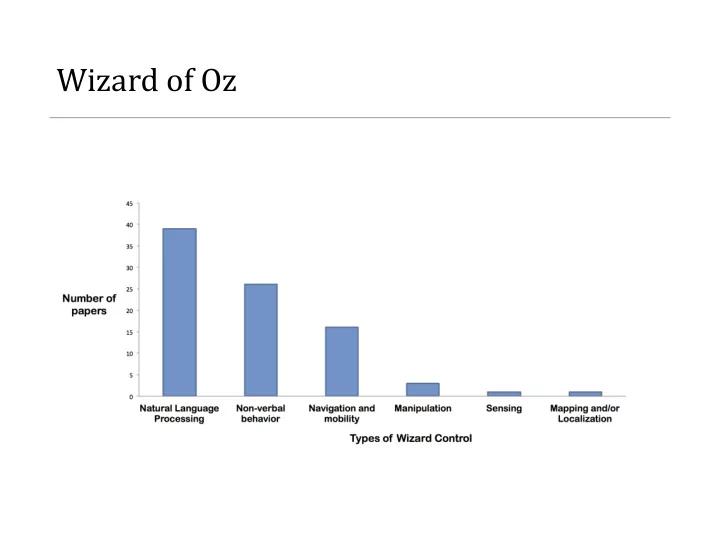

Wizard of Oz
Anthropomorphism • “the rationalization of animal or system behavior through superposing aspects of the human observer.” • “Having a naturalistic embodiment is often cited as necessary for meaningful social interaction [18,82,140].” - Fong et al. • “The role of anthropomorphism is to function as a mechanism through which social interaction can be facilitated.”
How People Anthropomorphize Robots Susan R. Fussell, Sara Kiesler, Leslie D. Setlock, Victoria Yew, HRI 2008
How People Anthropomorphize Robots Susan R. Fussell, Sara Kiesler, Leslie D. Setlock, Victoria Yew, HRI 2008 The results clearly demonstrate a disjuncture between anthropomorphism in people’s spontaneous reactions to robots in social context and anthropomorphism in their more carefully considered conceptions of robots in the abstract. In participants’ free form summaries of health interviews, they used words to express positive and negative emotions, cognitive mechanisms, and social interaction equally much for robotic and human interviewers. …their more carefully reasoned responses in the post-task questionnaire revealed a much more mechanical view. Here, the vast majority of participants in both conditions denied that a robot could have moods, experience frustration, or possess feelings …
Embodiment • Defines social expectations • Biases interaction • Constrains the types of physical interactions caricature functional zoomorphic anthropomorphic
Caricature Tofu Ryan Wistort Cynthia Breazeal MIT Media Lab
Functional Design Twendy One Sugano Lab, Waseda University
Caricature Keepon Hideki Kozima and Marek Michalowski
Caricature/Zoomorphic Leonardo Cynthia Breazeal MIT
Anthropomorphic? Zoomorphic? Kismet Cynthia Breazeal Rodney Brooks MIT
Anthropomorphic Einstein Hanson Robotics
Anthropomorphic Einstein Hanson Robotics
Anthropomorphic Geminoids Hiroshi Ishiguro Osaka University
Salient Features of Geminoid • Copy of existing human being, Professor Hiroshi Ishiguro • Teleoperated – actions and speech • 50 actuators • 13 in the face • 15 in the torso • 22 in the arms and legs • Mimics operator’s conscious and unconscious movements
“ When I first saw HI-1 sitting still, it was like looking in a mirror. However, when it began moving, it looked like somebody else, and I couldn’t recognize it as myself. ” Hiroshi Ishiguro
“ While operating HI-1 with the operation interface, I find myself unconsciously adapting my movements to the geminoid movements… I felt that, not just the geminoid but my own body is restricted ” to the movements that HI-1 can make. Hiroshi Ishiguro
“ When a visitor pokes HI-1, especially around its face, I get a strong feeling of being poked myself. ” Hiroshi Ishiguro
HRP 4C, Hubo Einstein, RoboKind
Telenoid R1
CB2
Psychological basis for the Uncanny Valley • Some studies show: • Facial “attractiveness” (beauty) has biological/developmental roots • Evidence of universal neuro-teplates that have evolved to detect beauty, ill health, danger, and “unusualness” • Even small deviations can change a face from beautiful to ugly or disturbing • Beauty and ugliness elicit consistent human responses across gender, age and culture
Attractive Characteristics • Clear skin • Well-groomed hair • Large expressive features • Baby-like features (large eyes and forehead, small nose and jaw)
Unattractive Characteristics • Sickly eyes • Bad skin • Poor grooming • Asymmetry • Any sign of illness or injury • Facial expressions associated with psychosis or terror People are especially sensitive to real human faces
Black solid line – strange/familiar Red dashed line – eeriness MacDorman2006
Black solid line – strange/familiar Red dashed line – eeriness MacDorman2006
Uncanny Morph
Not Uncanny Morph
Is human likeness the most significant factor in the uncanny valley? • Hanson: • “…the attractively-tuned figures were found to be consistently low in eeriness and high in appeal. This strongly implies that reaction is at least partially decoupled from realism. These results also imply that, with well-tuned faces, there can exist a continuum of appealing anthropomorphism across the range of realism, thus supporting the hypothesis of no inherent uncanny valley.”
The Uncanny Valley
Learning from Animation
Discussion • Given the challenges of designing human-like robots, are they worth it? Are there applications that absolutely require anthropomorphic forms? • How can we go about studying uncanny motion?
Recommend
More recommend